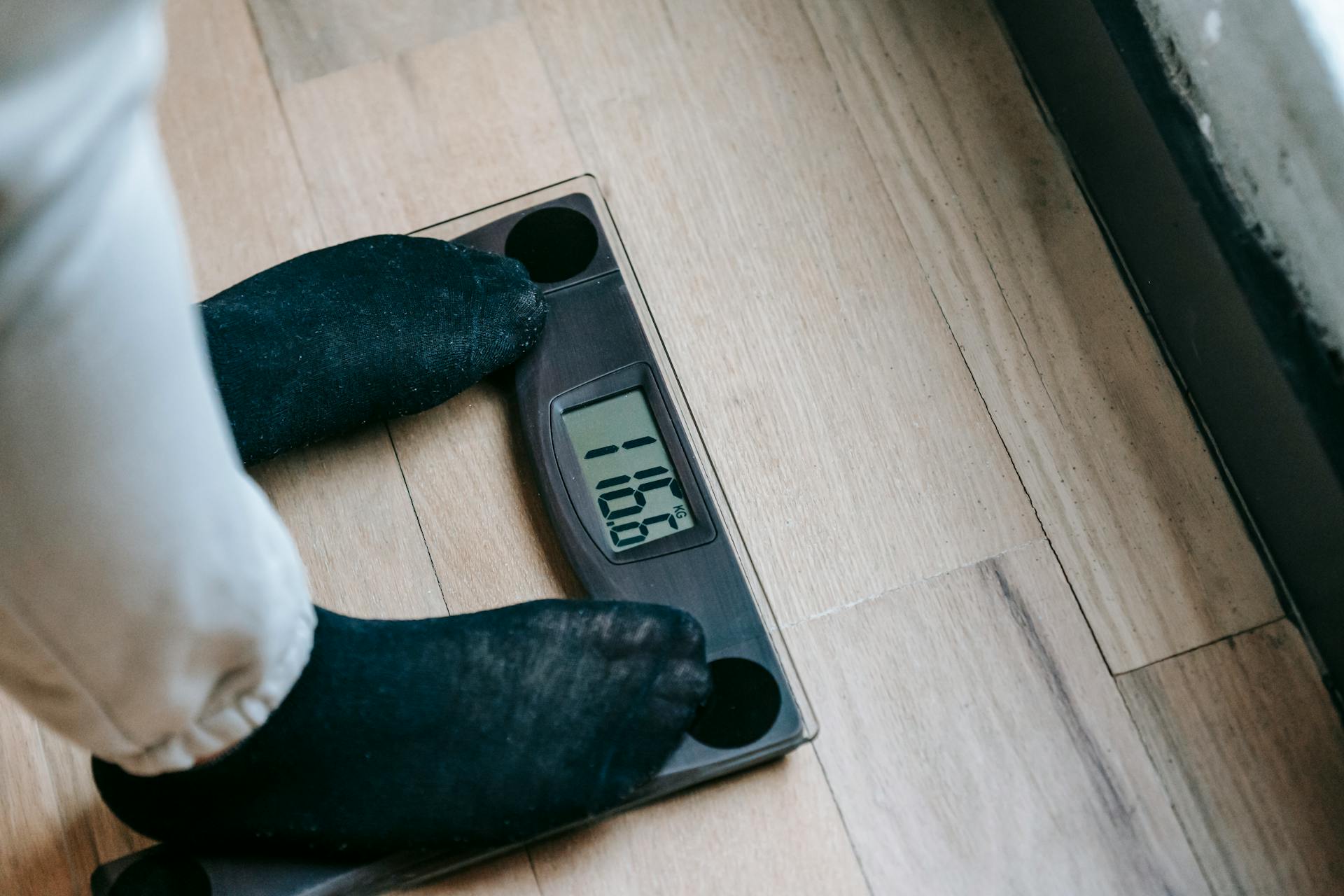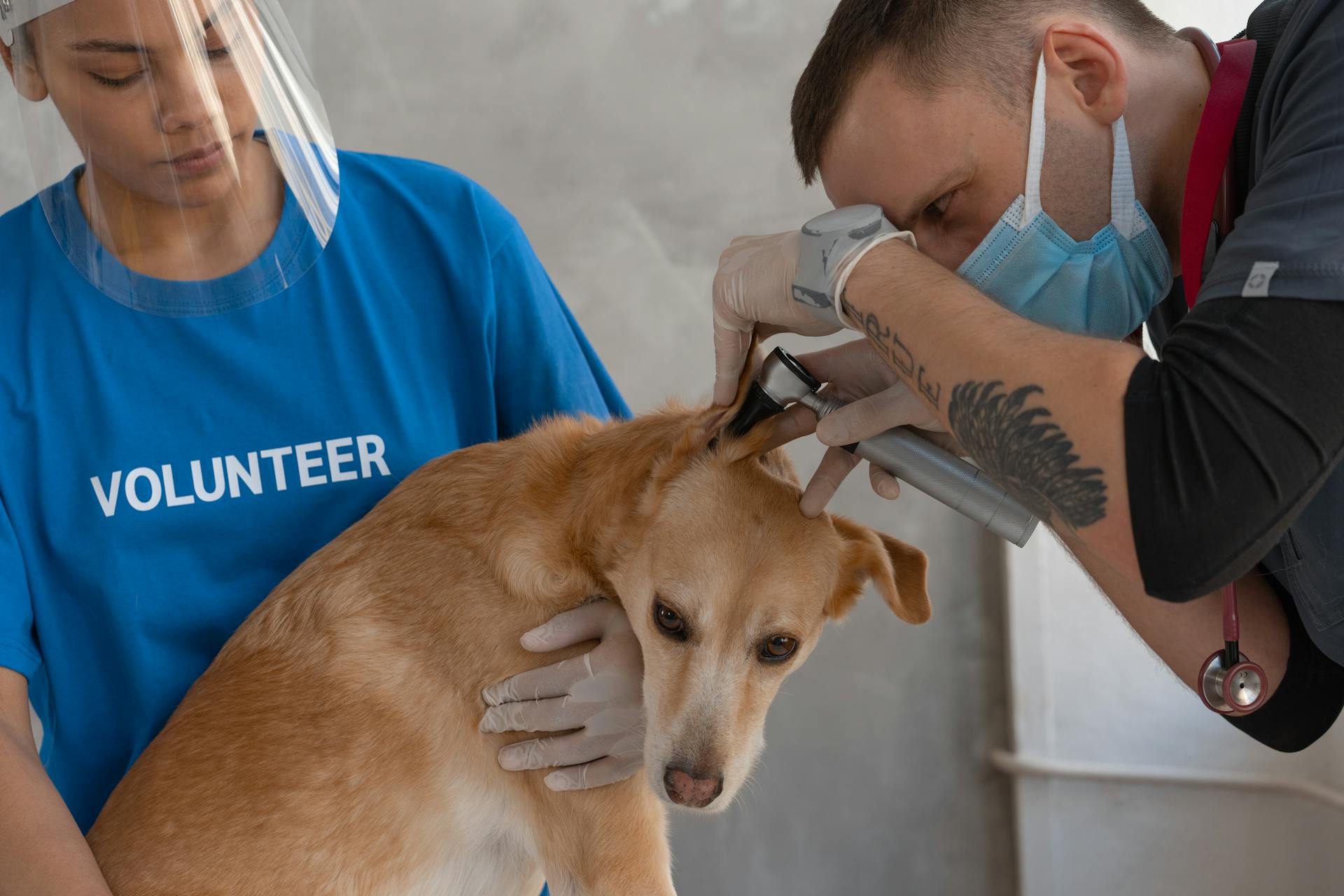
Many pet owners wonder if their male dog will gain weight after being neutered. The answer is yes, but not necessarily in the way you might think.
According to studies, male dogs that are neutered tend to gain weight due to changes in their hormone levels.
Neutering can lead to a decrease in testosterone, which can cause a decrease in muscle mass and an increase in body fat. This is because testosterone helps regulate metabolism and body composition.
In fact, a study found that neutered dogs are more likely to become overweight or obese, with 44% of neutered dogs in the study being overweight.
Discover more: Do Male Dogs Have Testosterone
Do Male Dogs Gain Weight After Being Neutered?
A spay or neuter for your dog is a nutritional inflection point, and it's essential to adjust their diet accordingly. Studies suggest a calorie reduction of up to 30 percent may be necessary to avoid weight gain post-neutering.
You'll need to speak to your vet to learn how this translates into reduced portion sizes. They may advise switching to a food with a lower calorie density and a higher nutrient density.
Engage your dog in physical activity to help them maintain a healthy weight. Taking your dog for more than two walks a day can work wonders for burning calories and keeping their mind off food.
Spaying or neutering can lead to changes in a dog's metabolism, making it more difficult for them to burn calories. This doesn't necessarily mean all dogs will gain weight after being neutered, but the risk is higher for some.
Monitor your dog's weight regularly and use dog body condition score (BCS) charts to ensure they're maintaining a healthy weight. Consult your vet if you notice any gradual weight gain.
You might enjoy: A Guide to Managing Healthy Weight in Your Dog This Summer
Spaying and Neutering
Spaying and neutering are surgical procedures that involve removing the ovaries and uterus in female dogs, or the testicles in male dogs. This is typically done to prevent reproduction, address medical issues, or correct behavioral problems.
Spaying, in particular, can lead to changes in a dog's metabolism, making it harder for them to burn calories. This is because spaying reduces the resting metabolic rate, meaning they require fewer calories to maintain their weight.
Studies have shown that spayed and neutered dogs are more likely to be overweight compared to sexually intact dogs. This is partly due to a decrease in physical activity, which can contribute to weight gain.
You might like: Disadvantages of Spaying a Female Dog
The Hormonal Factor
The loss of sex hormones when a dog's ovaries or testicles are removed causes a decrease in metabolic rate. This means calories are not burned as quickly, so fewer calories are needed for the dog to maintain its weight.
Those hormones also make a dog more likely to engage in physical activity, and the loss of them means the animal is less likely to burn as many calories in daily moving around.
Fewer calories are required because of hormonal changes, and the dog's slowed-down lifestyle means fewer calories are "used up." This can contribute to weight gain in some dogs.
Leptin and insulin are other hormones that can be affected by spaying or neutering. Leptin influences appetite, while insulin controls blood sugar.
Expand your knowledge: Diabetes in Dogs Weight Loss
Spaying vs Neutering
Spaying and neutering are two different surgical procedures that are performed on dogs for various reasons – for example, to prevent them from reproducing, for a medical reason or to correct behavioral problems.
Spaying is the procedure performed on female dogs, which involves the removal of the ovaries and uterus (ovariohysterectomy), or just the ovaries (ovariectomy).
Neutering is the procedure performed on male dogs, which involves the removal of the testicles.
Spaying and neutering are surgical procedures performed by a veterinarian under general anesthesia.
Readers also liked: How to Prevent Pyometra in Dogs without Spaying
Recognizing and Managing Weight Gain
Dogs can gain weight after being neutered, but it's not a foregone conclusion. A study from the Faculty of Veterinary Medicine at Belgium's University of Liege suggests a calorie reduction of up to 30 percent may be necessary for some dogs to avoid weight gain post-neutering.
To determine if your dog is overweight, use a Dog body condition score (BCS). The ideal condition score is 5, where you can easily feel your dog's ribs with minimal fat, see their waist when looking from above, and see the abdominal tuck when looking from the side.
Studies have shown that dog owners tend to underestimate their pet's body weight and BCS, so it's essential to use this score to accurately assess your dog's weight.
Suggestion: Anxiety in Dogs Body Language
If you notice any gradual weight gain, consult your vet for advice and adjustments to the feeding or exercise plan.
High-quality dog food specifically designed for weight management or neutered dogs can help control weight gain. These diets have fewer calories and can help your dog maintain a healthy weight.
A study has found that dogs that receive table scraps have a higher risk of being overweight, so be careful with what you feed your dog.
To manage weight gain, engage your dog in physical activity, such as taking them for more than two walks a day, playing catch, or having a game of chase around the house.
Here's a quick guide to monitoring your dog's weight and BCS:
- Keep track of your dog's weight regularly.
- Use dog body condition score (BCS) charts to see if your pup is maintaining a healthy weight.
- Consult your vet for advice and adjustments to the feeding or exercise plan if you notice any gradual weight gain.
By following these tips and being aware of the potential for weight gain, you can help your dog maintain a healthy weight and live a longer, healthier life.
Factors Affecting Weight Gain
The hormonal factor plays a significant role in weight gain after neutering, as it can cause a decrease in metabolic rate, resulting in fewer calories being burned.
This hormonal change can be a double whammy, as it also reduces the dog's likelihood of engaging in physical activity, further reducing calorie burn.
Leptin and insulin, two other hormones, may also be affected, leading to increased appetite, which is the last thing a dog needs when fewer calories are required to maintain body weight.
A study suggests that a calorie reduction of up to 30 percent may be necessary for some dogs to avoid weight gain after neutering.
This reduction in calories may require adjusting the amount and type of food, as well as incorporating more physical activity into the dog's daily routine.
Breed and Genetics
Labrador Retrievers are known for their love of food and may be more likely to gain weight after being spayed.
Some breeds are more prone to obesity due to their genetic makeup, which can affect their eating habits and metabolism.
Even if a dog is spayed or neutered, their breed and genetics can still play a significant role in determining their weight gain potential.
For example, Labrador Retrievers are more likely to gain weight even when they are sexually intact.
While genetics can't be changed, understanding a dog's breed and genetic predispositions can help owners take proactive steps to prevent obesity.
You might enjoy: Black Spot on Dog Tongue Labrador
Individual Variations

Some dogs may maintain a healthy weight with no issues, while others may require careful monitoring and management.
The extent to which spaying affects an individual dog's weight can vary significantly.
A study from the Faculty of Veterinary Medicine at Belgium's University of Liege suggests a calorie reduction of up to 30 percent may be necessary for some dogs to avoid weight gain post-spaying or neutering.
It's not possible to predict with certainty whether a dog will or won't gain weight after the procedure.
You'll want to keep an eye on your dog's weight and adjust their diet and exercise accordingly, as every dog is different.
Frequently Asked Questions
What are the negative effects of neutering male dogs?
Neutering male dogs can lead to health issues such as obesity, urinary incontinence, and hip dysplasia, as well as potential behavioral changes. Understanding these risks can help you make an informed decision about your dog's health and well-being.
How to get a dog to lose weight after neutering?
To help your dog lose weight after neutering, reduce their food portions by up to 25% or increase their exercise. Both changes can help maintain their previous weight, but ideally, a combination of both is best.
Sources
- https://stayloyal.com.au/blogs/news/why-do-desexed-dogs-put-on-weight
- https://drjudymorgan.com/blogs/blog/supporting-spayed-and-neutered-pets
- https://www.tuftsyourdog.com/doghealthandmedicine/does-spaying-or-neutering-really-lead-to-weight-gain/
- https://vetcarenews.com/do-dogs-gain-weight-after-being-spayed/
- https://www.mumsnet.com/talk/the_doghouse/4708401-did-neutering-make-your-dog-gain-weight
Featured Images: pexels.com


